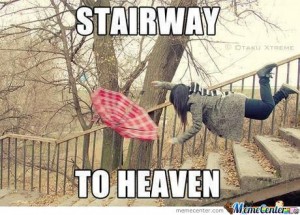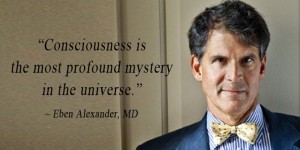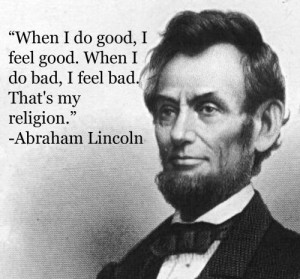A lot of people will say “I wasn’t a believer in X until I saw Y” in order to make their case about all things paranormal seem more believable. I’ve heard it over and over with ghost stories and near-death experiences and never gave much credence to any of it. I still don’t know how I feel about it; but a day or two ago I was mulling over the concept of afterlives and all that usual nonsense we can rabbit-hole our brains into thinking of when we’re alone, and something interesting happened.
While making my morning coffee, I happened to be randomly thinking that question that always comes up: “So…if everyone is supposed to follow some organized religion and only religion A is right, and all the others follow false gods, then that means all the nice people who live justly but follow religion B will go to eternal punishment? How does everyone who follows a specific religion believe this?”

Interestingly enough, not two minutes later, a bit came on a specific news channel (one which I don’t usually watch, but decided to tune into that day) about this neurosurgeon named Dr. Eben Alexander who had a near death experience himself, and who happens to live not too far from myself. He spoke of how (while laying in a meningitis induced coma during which what we know to be the dream/hallucinatory based parts of his brain were definitely off), he went to an indescribable multiverse of melody, color, dead friends, and what he thought to be god itself.
Hearing me talk about it isn’t going to generate much other than an eyeroll or a comment like “All he’s missing are the pearly gates in that story” But something did resonate with me, for some reason.
Was it the strange detail and commitment in his voice? Is it because he admits he’s Christian “in name only”? Did he seem more believable because he adheres to science over religious rules? After pouring my college years into a Biology degree, I can’t help but think from a scientific point of view. For a long time, I’ve tried to make logic out of everything, including the soul – even if it meant applying hypothetical principles.
When you don’t have the answers to everything, anything is possible
While I stand by my belief that “God” is something of the quantum mechanics genre (versus the clear cut icons religions like to package up, complete with parameters), I don’t pretend to know just exactly what that means.

Yes, we’re all flesh bags, synapsing via neurons and sparking up pheromone based dynamics with one another. Does that mean we’re nothing more than biological robots who cease and desist the moment our hearts power off?
Not necessarily.
There’s this widely popular “fact” that gets passed around – that we “only use X percent of our brains”. Ten is it? Who decided that? The scientific team who couldn’t find out that activity elsewhere in the brain was transpiring?
Just because we can’t detect it, doesn’t mean it doesn’t exist.
What about when you call someone just as they’re calling you? Or better yet, you text someone you haven’t seen or heard from in several days, and on the exact day, at the same random second in the afternoon – you both message eachother about the same topic? Or when a phrase or concept won’t leave your brain, and then someone else independently somewhere brings it up at random?
Maybe we can’t detect the use of the other brain parts because it’s not dictated by measurable neural activity as we know it, but by something bigger or more interconnected. Who knows. So then, what of the afterlife?
A while ago, I came up with an idea about death that made sense to me, explained in the following syllogism:
1. Energy can’t be destroyed, so our conscience lives on in another form
2. Our brain is vast and interconnected.
3. We consciously and subconsciously construct memories, associations, and connections during life into this large, interconnected web.
4. Thus, when our bodies die, this web of interconnected energy called our consciousness lives on as it was from the moment we were born up until the moment that we died.
The best visual way I can think to describe it is like an after-image optical illusion:

After you’re no longer staring at the image, it’s still there, in front of your eyes. It’s in another form, elsewhere and around you – like a memory of exactly what was previously in black in white, but disembodied from its former form and color. This is just an idea I have – but it’d collectively describe the idea of spirits hanging around, reincarnation, and past lives.
What if eternity is just one big reverberation of everything we’ve ever experienced?
Bringing back this entry full circle, if you think Dr. Alexander was describing a paradise that actually exists and is waiting for at least some of us, I think it’d make sense to ask him less about what it was like and more about how he’s been living his life that he got to go there (as he admits he’s not a strict rule-following Christian).
But let’s say we’re both right. Let’s say it’s not even a “place” that is heaven, but an extension of my own theory:
If our consciousness lives on like an infinite memory stamp of everything we intentionally and unintentionally fed it during life, then maybe the afterlife is just an infinity of exactly that: If we die content, we mostly relive all our happy associations forever. If we die in sadness (like those who resort to suicide), there would be an infinity of mostly sadness and the negativity we knew in life, awaiting us.
I say mostly, because our psyche is not all positive or all negative. And if eternity is the resonating of whatever we constructed in life, we could hypothetically take ladders between the bad and the good, right?

Since our bodies would no longer accompany our conscience, we could no longer distract ourselves from painful emotions via the usual physical pleasures we can enjoy while alive (anything from sex or food to yoga or exercise). Take away those physical stimuli, and it makes sense that whatever emotions we have would resonate on an amplified level and eternally post mortem.
With respect to the “ladder” theory, because no new external stimuli can be received by physical senses after death, the only way to change our negative emotions would be to retrace those existing ladders of the network we’ve created during life to access the parts we know to be positive. And that would be – respectively – heaven and hell, with access points we’ve generated during life, driving us between the two:
Those points could be the memory of a song, a scent, name, etc.

To reinforce my theory, Alexander describes (in another interview), going between these places of light and dark by recalling the notes to a “melody” which would spin away all the ugliness and take him to the light. He doesn’t seem to know himself what he’s describing or how or why it happened, but what stuck with me is that he said he never stayed at either place indefinitely. Inevitably, he would somehow come back to the murky place, and have to recall the notes to the beautiful song that took him out back to the beautiful place. Could he be describing exactly what I’ve been thinking all along?
Are we making the blueprints to our own eternity as we speak?
I love science to death (pardon the pun) because it’s something we can use to make sense of matters most of the time while we’re still here on Earth. However, I’ve come to realize that you must take science with a grain of salt and accept that hypothetical theories might be possible.
Because when you box in your mind and seal the corners with dogma of any kind – including scientific proofs and theories – then that becomes your bible, the scientists become your iconic God, and you’re suddenly no better than the religious zealot sitting in front of you in traffic with a bumper full of holier-than-thou sinner condemnations and a rosary hanging from the rearview.

Summary? Live as though there is a god, but not as though it’s some sadistic dick. If you die a month from now having tried to strike a balance between work, laughter, pleasure, and compassion, you likely won’t go out thinking, “Well that was a waste when I could have been an asshole” – Regardless of the many ways eternity might pan out to be.
xoxo
<3~A